The woman who turns wedding dresses into gowns for stillborn babies
The loss of a longed-for baby girl led Kimberly Shaw-Walker to look for ways to help other mothers going through the same experience.
Kim lost her daughter Sarah in December 2013 when she was 35 weeks pregnant.
She told the BBC Alba documentary Gaol is Call/Labour of Love that after the initial loss and the funeral she felt she was going to "explode" if she did not find a way of coping with the grief.
Kim says: "In the summer of 2015 I was at the point where I thought 'I have to do something for Sarah other than cry'.
"I was talking to a friend of mine who is a bereavement counsellor and she said 'if you could change one thing, other than the outcome, what would it be'?
"Without really having to think I said 'something to dress her in'."
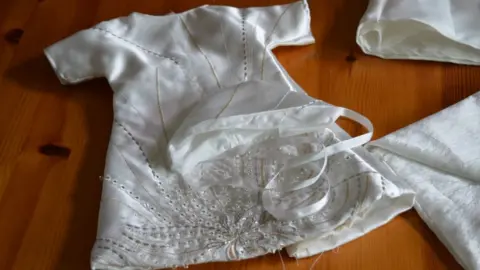
Within days Kim had appealed on Facebook for old wedding dresses that people would not mind being chopped up to make gowns for stillborn babies.
"Within the first month we had 37 wedding gowns," she says.
Since then she has had many more sent to her from places as far away as Australia and Canada.
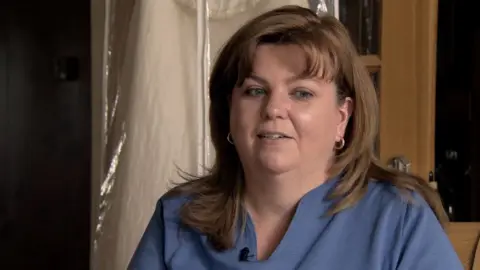
Kim grew up in Michigan and lived in Alaska before meeting her husband Nigel on holiday and relocating to Lauder in the Scottish Borders.
She had a son and Nigel had three children before they met, whom Kim adopted.
The couple had a son together in 2010 and their daughter Sarah had been expected in January 2014.
It was Kim's experience when seeing Sarah for the final time that led her to embark on making gowns for stillborn babies to wear while bereaved parents spent precious moments with them.
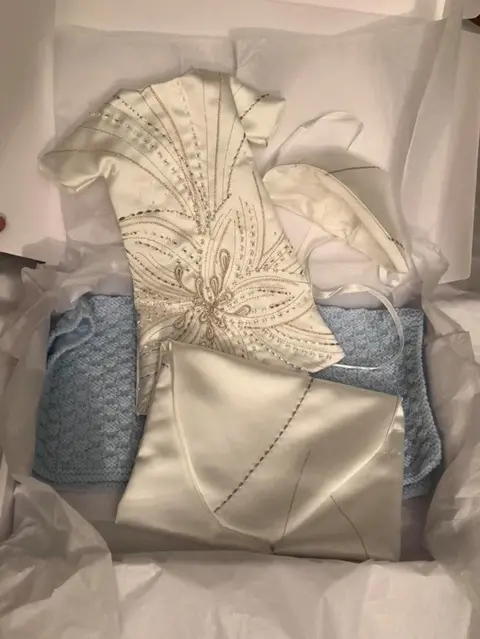 Zaagi
Zaagi
Kim says: "We were in the hospital and we were going to have this one more time with her when we could bath her, dress her and our minister was coming in to have her blessed and we did not have something to put her in.
"My husband was on this mad dash and we just happened to know people who had a baby shop in Kelso.
"But when it came to actually dressing her, there are things that happen physiologically so it is not a matter of just putting a dress on.
"You actually need something more like what you would put on a doll."
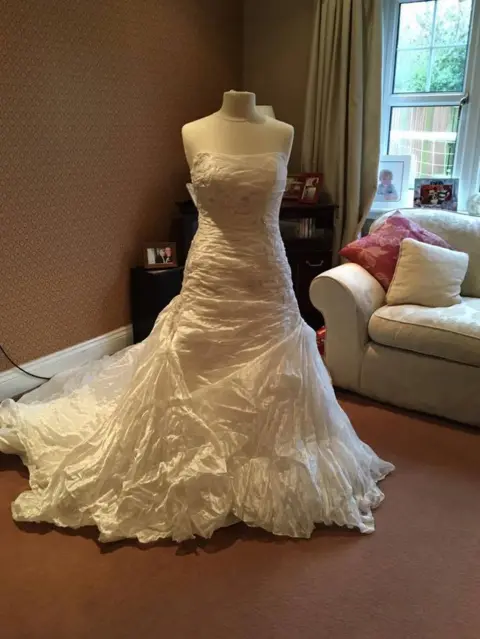 Zaagi
Zaagi
Kim says it was "incredibly stressful" to try to dress her baby using shop-bought clothes.
"I kept having to stop because my hands were shaking so bad," she says.
"I was absolutely terrified I was going to harm her trying to dress her and it is just because the garment wasn't suitable for what a stillborn baby's needs are."
"So for me, in hindsight, it was about having something that took the stress out of that because you have this one chance to have this experience with your baby."
In the three years since she set up charity Zaagi, which means "to be loved and treasured" in the native American language of her home state, Kim has made hundreds of gowns for stillborn babies.
She says the gowns are made for the "very specific needs" of stillborn babies, with the back open and snap closures.
"Instead of it being one solid piece you just slip it on and close it up," she says.
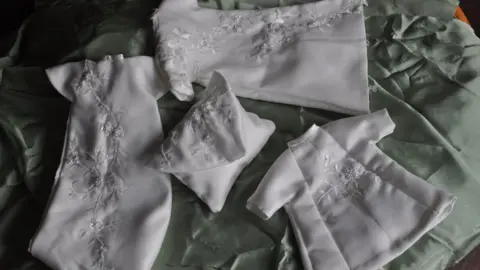
Kim says the gowns need to be "absolutely perfect" because they take the place of everything else in the child's life.
"This takes the place of a Christening gown, their first pair of shoes, their first school uniform, their wedding gown, everything," she says.
For mothers who miscarry before 20 weeks, Kim makes a "nesting blanket" as the baby is too small to be dressed before that, she says.
"We make these in sizes down to 3in square," Kimberly says.
"We make them so there is a pouch to lay the baby in and then the sides snap together so that baby's face is never covered."
Kim says each wedding dress can be made into about nine baby sets.
Both the nesting blankets and the blessing gowns come with a keepsake pouch made of the same material, which the parents can keep.

Stillbirths in Scotland
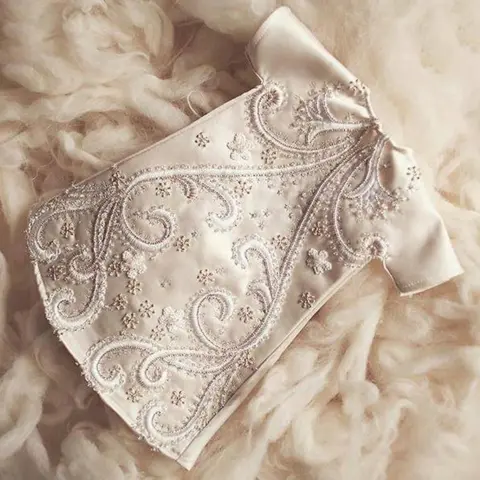 Zaagi
ZaagiA stillbirth is recorded when a child is delivered after the 24th week of pregnancy and does not breathe or show any other sign of life.
Last year in Scotland there were 225 stillbirths.
There were 52,861 live births.
The stillbirth rate is 4.2 per 1,000 live births.

'Something valuable'
Kim has supplied gowns and blankets to Borders General Hospital and Edinburgh Royal Infirmary as well as hospitals in Glasgow and Aberdeen.
She says the gowns, which come in a selection of sizes and designs, are stored in the hospital so that no parent misses the opportunity to have one.
For Kimberly, making the gowns is bringing something valuable out of the loss of her child.
"It is something that has made a difference for other families," she says.
"That for me if the most powerful thing.
"It always breaks your heart when a hospital calls because they are out and need more gowns because you know there are more families that are now on this journey."
